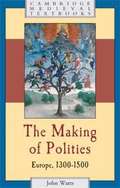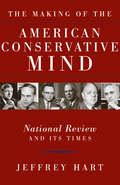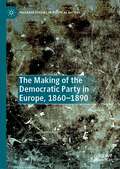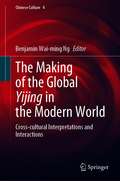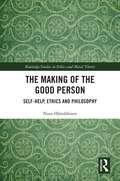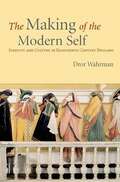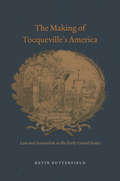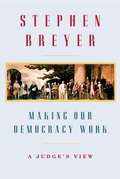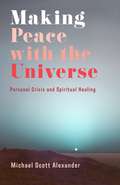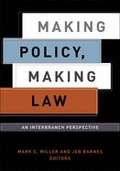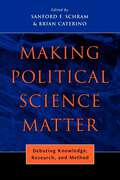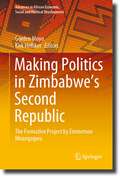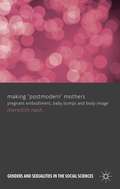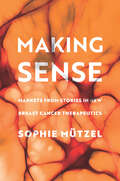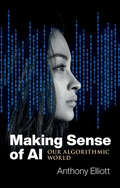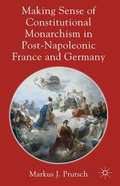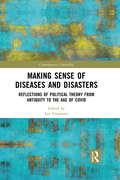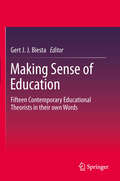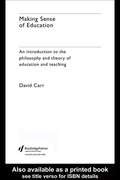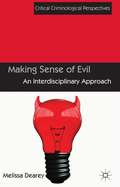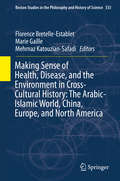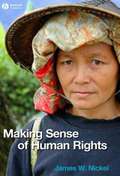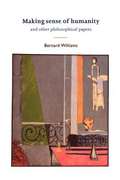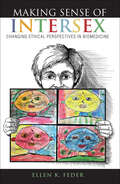- Table View
- List View
The Making of Polities: Europe, 1300-1500
by John WattsThis major survey of political life in late medieval Europe - the first for more than thirty years - provides an entirely new framework for understanding the developments that shaped this turbulent period. Rather than emphasising crisis, decline, disorder or the birth of the modern state, this account centres on the mixed results of political and governmental growth across the continent. The age of the Hundred Years War, schism and revolt was also a time of rapid growth in jurisdiction, taxation and representation, of spreading literacy and evolving political technique. This mixture of state formation and political convulsion lay at the heart of the 'making of polities'. Offering a full introduction to political events and processes from the fourteenth century to the sixteenth, this book combines a broad, comparative account with discussion of individual regions and states, including eastern and northern Europe alongside the more familiar west and south.
The Making of the American Conservative Mind: National Review and Its Times
by Jeffrey HartNational Review has been the leading conservative national magazine since it was founded in 1955, and in that capacity it has played a decisive role in shaping the conservative movement in the United States. In The Making of the American Conservative Mind, Jeffrey Hart provides an authoritative and high-spirited history of how the magazine has come to define and defend conservatism for the past fifty years. He also gives a firsthand account of the thought and sometimes colorful personalities—including James Burnham, Willmoore Kendall, Russell Kirk, Frank Meyer, William Rusher, Priscilla Buckley, Gerhart Niemeyer, and, of course, the magazine&’s founder, William F. Buckley Jr.—who contributed to National Review&’s life and wide influence.As Hart sees it, National Review has regularly veered toward ideology, but it has also regularly corrected its course toward, in Buckley&’s phrase, a &“politics of reality.&” Its catholicity and originality—attributable to Buckley&’s magnanimity and sense of showmanship—has made the magazine the most interesting of its kind in the nation, concludes Hart. His highly readable and occasionally contrarian history, the first history of National Review yet published, marks another milestone in our understanding of how the conservatism now so influential in American political life draws from, and in some ways repudiates, the intellectual project that National Review helped launch a half century ago.
The Making of the Democratic Party in Europe, 1860–1890 (Palgrave Studies in Political History)
by Anne HeyerThis book analyses the emergence of modern parties in nineteenth-century Europe and explores their connection with the slowly developing institution of democracy. The close relationship between party and democracy was established by the founders of the first modern parties who presented themselves as representatives of the people. Focusing on the ideas and practices of party founders, this book moves away from the traditional view that party formation was the result of industrialisation. It instead shows that the response of party founders was to frame and establish the modern party as an alternative to existing models of political representation, and one that was characterised by popular participation.In order to mobilize their followers, party founders gave new meaning to existing structures and developed new practices of political organization. The result was the creation of organizations that continue to shape the history of modern democracy.Exploring the foundation of three political parties: the German Social Democratic Workers’ Party (SDAP); the Dutch Anti-Revolutionary Party (ARP); and the British National Liberal Federation, the author analyses the phenomenon of innovative party formation in nineteenth-century Europe, before the democratic mass-membership party had become a widely accepted concept. Taking a transnational and comparative approach, this book illustrates the decisive role of party founders in the formation of modern democracy, making it an essential read for anyone researching the history of democracy and political parties.
The Making of the Global Yijing in the Modern World: Cross-cultural Interpretations and Interactions (Chinese Culture #4)
by Benjamin Wai-ming NgThis book represents an ambitious effort to bring leading Yijing scholars together to examine the globalisation and localisation of the 'Book of Changes' from cross-cultural and comparative perspectives. It focuses on how the Yijing has been used to support ideologies, converted into knowledge, and assimilated into global cultures in the modern period, transported from the Sinosphere to British, American and French cultural traditions, travelling from East Asia to Europe and the United States. The book provides conceptualised narratives and cross-cultural analyses of the global popularisation and local assimilation of the Yijing, highlighting the transformation and application of the Yijing in different cultural traditions, and demonstrating how it acquired different meanings and took on different roles in the context of a global setting. In presenting a novel contribution to understandings of the multifaceted nature of the Yijing, this book is essential reading for scholars and students interested in the 'Classic of Changes'. It is also a useful reference for those studying Chinese culture, Asian philosophy, East Asian studies, and translation studies.
The Making of the Good Person: Self-Help, Ethics and Philosophy (Routledge Studies in Ethics and Moral Theory)
by Nora HämäläinenThis book provides a philosophical assessment of the idea of personhood advanced in popular self-help literature. It also traces, within academic philosophy and philosophical scholarship, a self-help culture where the self is brought forth as an object of improvement and a key to meaning, progress, and profundity. Unlike other academic treatments of the topic of self-help, this book is not primarily concerned with providing a critique of popular self-help and self-transformative practices. Rather, it is concerned with how they work to shape contemporary forms and ideals of moral personhood and are conducive to moral renegotiation and change. The book consists of two parts with somewhat different argumentative strategies. Part 1 consists of an overview and reassessment of popular self-help literature and its sociological and journalistic critics, written from a moral philosophical perspective. Part 2 opens with discussion of the current attraction, among a range of philosophers, to self-transformative themes. The chapters assess the strand of self-transformative philosophy found in the work of Ludwig Wittgenstein, Michel Foucault, Pierre Hadot, Stanley Cavell, and Iris Murdoch. Finally, the book concludes with a discussion of the theme of social change and moral renegotiation in contemporary societies, which is a central but underestimated undercurrent in discussions on contemporary self-transformative practices. The book’s dual perspective—on both popular self-help and self-transformative currents in philosophy—enables a cultural and moral philosophical analysis of contemporary ethical ideals of personhood, as well as reflection on the literatures available for its development. The Making of the Good Person will be of interest to scholars and advanced students working in moral philosophy, history of philosophy, psychology, sociology, and literary studies.
The Making Of The Modern Self: Identity And Culture In Eighteenth-century England
by Dror Wahrman02 Toward the end of the eighteenth century, a radical change occurred in notions of self and personal identity. This was a sudden transformation, says Dror Wahrman, and nothing short of a revolution in the understanding of selfhood and of identity categories including race, gender, and class. In this pathbreaking book, he offers a fundamentally new interpretation of this critical turning point in Western history.Wahrman demonstrates this transformation with a fascinating variety of cultural evidence from eighteenth-century England, from theater to beekeeping, fashion to philosophy, art to travel and translations of the classics. He discusses notions of self in the earlier 1700s-what he terms the ancien regime of identity-that seem bizarre, even incomprehensible, to present-day readers. He then examines how this peculiar world came to an abrupt end, and the far-reaching consequences of that change. This unrecognized cultural revolution, the author argues, set the scene for the array of new departures that signaled the onset of Western modernity.Dror Wahrman is associate professor of history at Indiana University (Bloomington).
The Making of Tocqueville's America: Law and Association in the Early United States (American Beginnings, 1500-1900 Ser.)
by Kevin ButterfieldAlexis de Tocqueville was among the first to draw attention to Americans’ propensity to form voluntary associations—and to join them with a fervor and frequency unmatched anywhere in the world. For nearly two centuries, we have sought to understand how and why early nineteenth-century Americans were, in Tocqueville’s words, “forever forming associations.” In The Making of Tocqueville’s America, Kevin Butterfield argues that to understand this, we need to first ask: what did membership really mean to the growing number of affiliated Americans? Butterfield explains that the first generations of American citizens found in the concept of membership—in churches, fraternities, reform societies, labor unions, and private business corporations—a mechanism to balance the tension between collective action and personal autonomy, something they accomplished by emphasizing law and procedural fairness. As this post-Revolutionary procedural culture developed, so too did the legal substructure of American civil society. Tocqueville, then, was wrong to see associations as the training ground for democracy, where people learned to honor one another’s voices and perspectives. Rather, they were the training ground for something no less valuable to the success of the American democratic experiment: increasingly formal and legalistic relations among people.
Making Our Democracy Work: A Judge's View
by Stephen BreyerThe Supreme Court is one of the most extraordinary institutions in our system of government. Charged with the responsibility of interpreting the Constitution, the nine unelected justices of the Court have the awesome power to strike down laws enacted by our elected representatives. Why does the public accept the Court's decisions as legitimate and follow them, even when those decisions are highly unpopular? What must the Court do to maintain the public's faith? How can the Court help make our democracy work? These are the questions that Justice Stephen Breyer tackles in this groundbreaking book. Today we assume that when the Court rules, the public will obey. But Breyer declares that we cannot take the public's confidence in the Court for granted. He reminds us that at various moments in our history, the Court's decisions were disobeyed or ignored. And through investigations of past cases, concerning the Cherokee Indians, slavery, and Brown v. Board of Education, he brilliantly captures the steps--and the missteps--the Court took on the road to establishing its legitimacy as the guardian of the Constitution. Justice Breyer discusses what the Court must do going forward to maintain that public confidence and argues for interpreting the Constitution in a way that works in practice. He forcefully rejects competing approaches that look exclusively to the Constitution's text or to the eighteenth-century views of the framers. Instead, he advocates a pragmatic approach that applies unchanging constitutional values to ever-changing circumstances--an approach that will best demonstrate to the public that the Constitution continues to serve us well. The Court, he believes, must also respect the roles that other actors--such as the president, Congress, administrative agencies, and the states--play in our democracy, and he emphasizes the Court's obligation to build cooperative relationships with them. Finally, Justice Breyer examines the Court's recent decisions concerning the detainees held at Guantánamo Bay, contrasting these decisions with rulings concerning the internment of Japanese-Americans during World War II. He uses these cases to show how the Court can promote workable government by respecting the roles of other constitutional actors without compromising constitutional principles. Making Our Democracy Work is a tour de force of history and philosophy, offering an original approach to interpreting the Constitution that judges, lawyers, and scholars will look to for many years to come. And it further establishes Justice Breyer as one of the Court's greatest intellectuals and a leading legal voice of our time.
Making Peace with the Universe: Personal Crisis and Spiritual Healing
by Michael Scott AlexanderThe world’s great religious and philosophical traditions often include poignant testimonies of spiritual turmoil and healing. Following episodes of harrowing personal crisis, including addictions, periods of anxiety and panic, and reminders of mortality, these accounts then also describe pathways to consolation and resolution.In Making Peace with the Universe, Michael Scott Alexander reads diverse classic religious accounts as masterpieces of therapeutic insight. In the company of William James, Socrates, Muslim legal scholar turned mystic Hamid al-Ghazali, Chinggis Khan as described by the Daoist monk Qui Chuji, and jazz musician and Catholic convert Mary Lou Williams, Alexander traces the steps from existential crisis to psychological health. He recasts spiritual confessions as case histories of therapy, showing how they remain radical and deeply meaningful even in an age of scientific psychology. They record the therapeutic affect of spiritual experience, testifying to the achievement of psychological well-being through the cultivation of an edifying spiritual mood.Mixing scholarly learning with episodes from his own skeptical quest, Alexander demonstrates how these accounts of private terror and personal triumph offer a model of therapy through spiritual adventure. An interdisciplinary consideration of the shared terrain of religion and psychology, Making Peace with the Universe offers an innovative view of what spiritual traditions can teach us about finding meaning in the modern world.
Making Policy, Making Law: An Interbranch Perspective (American Governance And Public Policy)
by Mark Miller Jeb Barnes Robert KatzmannThe functioning of the U.S. government is a bit messier than Americans would like to think. The general understanding of policymaking has Congress making the laws, executive agencies implementing them, and the courts applying the laws as written--as long as those laws are constitutional. Making Policy, Making Law fundamentally challenges this conventional wisdom, arguing that no dominant institution--or even a roughly consistent pattern of relationships--exists among the various players in the federal policymaking process. Instead, at different times and under various conditions, all branches play roles not only in making public policy, but in enforcing and legitimizing it as well. This is the first text that looks in depth at this complex interplay of all three branches. The common thread among these diverse patterns is an ongoing dialogue among roughly coequal actors in various branches and levels of government. Those interactions are driven by processes of conflict and persuasion distinctive to specific policy arenas as well as by the ideas, institutional realities, and interests of specific policy communities. Although complex, this fresh examination does not render the policymaking process incomprehensible; rather, it encourages scholars to look beyond the narrow study of individual institutions and reach across disciplinary boundaries to discover recurring patterns of interbranch dialogue that define (and refine) contemporary American policy. Making Policy, Making Law provides a combination of contemporary policy analysis, an interbranch perspective, and diverse methodological approaches that speak to a surprisingly overlooked gap in the literature dealing with the role of the courts in the American policymaking process. It will undoubtedly have significant impact on scholarship about national lawmaking, national politics, and constitutional law. For scholars and students in government and law--as well as for concerned citizenry--this book unravels the complicated interplay of governmental agencies and provides a heretofore in-depth look at how the U.S. government functions in reality.
Making Political Science Matter: Debating Knowledge, Research, and Method
by Sanford F. Schram Brian CaterinoMaking Political Science Matter brings together a number of prominent scholars to discuss the state of the field of Political Science. In particular, these scholars are interested in ways to reinvigorate the discipline by connecting it to present day political struggles. Uniformly well-written and steeped in a strong sense of history, the contributors consider such important topics as: the usefulness of rational choice theory; the ethical limits of pluralism; the use (and misuse) of empirical research in political science; the present-day divorce between political theory and empirical science; the connection between political science scholarship and political struggles, and the future of the discipline. This volume builds on the debate in the discipline over the significance of the work of Bent Flyvbjerg, whose book Making Social Science Matter has been characterized as a manifesto for the Perestroika Movement that has roiled the field in recent years.Contributors include: Brian Caterino, Stewart Clegg, Bent Flyvbjerg, Mary Hawkesworth, Patrick Thaddeus Jackson, Gregory J. Kasza, David Kettler, David D. Laitin, Timothy W. Luke, Theodore R. Schatzki, Sanford F. Schram, Peregrine Schwartz-Shea, Corey S. Shdaimah, Roland W. Stahl, and Leslie Paul Thiele.
Making Politics in Zimbabwe’s Second Republic: The Formative Project by Emmerson Mnangagwa (Advances in African Economic, Social and Political Development)
by Gorden Moyo Kirk HellikerThe book provides a fresh and innovative interpretation of the new government of Zimbabwe led by Emmerson Mnangagwa, which emerged in late 2017 after the downfall of Robert Mugabe. It demonstrates the contradictory character of the Mnangagwa government, involving both continuities and discontinuities in relation to Mugabe’s regime . The temptation amongst Zimbabwean scholars has been to focus on the continuities and to dismiss the significance of any discontinuities, notably reform measures. This book adopts an alternative approach by identifying and focusing specifically on the existence of a formative project of the Mnangagwa’s Second Republic, further analysing its political significance, as well as risks and limitations. While doing so, the book covers topics such as reform measures, reconciliation, transitional justice, corruption, the media, agriculture, devolution, and the debt crisis as well as health and education. Discussing the limitations of these different reform measures, the book highlights that any scholarly failure to identify the risks of the project leads to an incomplete understanding of what constitutes the Mnangagwa’s Second Republic. The book appeals to students, scholars and researchers of Zimbabwean and African studies, political science and international relations, as well as policymakers interested in a better understanding of political reform processes.
Making ‘Postmodern’ Mothers
by Meredith NashBased on interviews with pregnant women, this book provides a multi-disciplinary empirical account of pregnant embodiment and how it relates to wider sociological and feminist discourses about gender, bodies, 'fitness', 'fat', celebrity and motherhood.
Making Sense: Markets from Stories in New Breast Cancer Therapeutics (Culture and Economic Life)
by Sophie MützelBreast cancer is one of the most commonly diagnosed cancers and a leading cause of death for women worldwide. With advances in molecular engineering in the 1980s, hopes began to rise that a non-toxic and non-invasive treatment for breast cancer could be developed. These hopes were stoked by the researchers, biotech companies, and analysts who worked to make sense of the uncertainties during product development. In Making Sense Sophie Mützel traces this emergence of "innovative breast cancer therapeutics" from the late 1980s up to 2010, through the lens of the narratives of the involved actors. Combining theories of economic and cultural sociology, Mützel shows how stories are integral for the emergence of new markets; stories of the future create a market of expectations prior to any existing products; stories also help to create categories on what such a new market and its products are about. Making Sense uses thousands of press statements, media reports, scientific reports, and financial and industry analyses, and combines qualitative and large-scale computational text analyses, to illustrate these mechanisms, presenting a fresh view of how life-prolonging innovations can be turned into market products.
Making Sense in Common: A Reading of Whitehead in Times of Collapse (Posthumanities)
by Isabelle StengersA leading philosopher seeks to recover &“common sense&” as a meeting place to reconcile science and philosophy With her previous books on Alfred North Whitehead, Isabelle Stengers not only secured a reputation as one of the premier philosophers of our times but also inspired a rethinking of critical theory, political thought, and radical philosophy across a range of disciplines. Here, Stengers unveils what might well be seen as her definitive reading of Whitehead.Making Sense in Common will be greeted eagerly by the growing group of scholars who use Stengers&’s work on Whitehead as a model for how to think with conceptual precision through diverse domains of inquiry: environmentalism and ecology, animal studies, media and technology studies, the history and philosophy of science, feminism, and capitalism. On the other hand, the significance of this new book extends beyond Whitehead. Instead, it lies in Stengers&’s recovery of the idea of &“common sense&” as a meeting place—a commons—where opposed ideas of science and humanistic inquiry can engage one another and help to move society forward. Her reconciliation of science and philosophy is especially urgent today—when climate disaster looms all around us, when the values of what we thought of as civilization and modernity are discredited, and when expertise of any kind is under attack.
Making Sense of AI: Our Algorithmic World
by Anthony ElliottIndustrial robots, self-driving cars, customer-service chatbots and Google’s algorithmic predictions have brought the topic of artificial intelligence into public debate. Why is AI the source of such intense controversy and what are its economic, political, social and cultural consequences? Tracing the changing fortunes of artificial intelligence, Elliott develops a systematic account of how automated intelligent machines impact different spheres and aspects of public and private life. Among the issues discussed are the automation of workforces, surveillance capitalism, warfare and lethal autonomous weapons, the spread of racist robots and the automation of social inequalities. Elliott also considers the decisive role of AI in confronting global risks and social futures, including global pandemics such as COVID-19, and how smart algorithms are impacting the search for energy security and combating climate change. Making Sense of AI provides a judiciously comprehensive account of artificial intelligence for those with little or no previous knowledge of the topic. It will be an invaluable book both for students in the social sciences and humanities and for general readers.
Making Sense of Constitutional Monarchism in Post-Napoleonic France and Germany
by Markus J. PrutschThe collapse of the Napoleonic order in 1814 symbolised a victory over revolutionary principles, yet it was impossible to turn the clock back and negate the legacy of the Revolution and the Napoleonic age. Could monarchical claims for personal government be realistically reconciled with the legacy of the Revolution? This dilemma gave rise to the concept of a genuinely 'monarchical' form of political rule in Europe, which distinguished itself not only from absolutism and revolutionary constitutionalism, but also British parliamentarianism. Focusing on the genesis of 'constitutional monarchism' in the context of the French Restoration and its favourable reception in post-Napoleonic Germany, this study highlights the potential and limitations of the daring attempt to improve traditional forms of monarchical legitimacy by means of a modern representative constitution. With historical, legal and politico-theoretical aspects equally examined, this work contributes towards a clearer understanding both of the 19th century and European constitutionalism.
Making Sense of Diseases and Disasters: Reflections of Political Theory from Antiquity to the Age of COVID (Contemporary Liminality)
by Lee TrepanierThis book examines diseases and disasters from the perspective of social and political theory, exploring the ways in which political leaders, social activists, historians, philosophers, and writers have tried to make sense of the catastrophes that have plagued humankind from Thucydides to the present COVID pandemic. By adopting the perspective of political theory, it sheds light on what these individuals and events can teach us about politics, society, and human nature, as well as the insights and limitations of political theory. Including thinkers such as Thucydides, Sophocles, Augustine, Bacon, Locke, Hume, Rousseau, Publius, Bartolomé de las Casas, Jane Addams, Camus, Saramago, Baudrillard, Weber, Schmitt, Voegelin and Agamben, it considers a diverse range of events including the plagues of Byzantium and 14th century Europe, 9/11, the hurricanes of Fukushima, Boxing Day, and New Orleans, and the current COVID pandemic. An examination of past, present, and future diseases and disasters, and the ways in which individuals and societies react to them, this volume will appeal to scholars of politics, sociology, anthropology and philosophy with interests in disaster and the social body.
Making Sense of Education
by Gert BiestaThis volume gives educational theorists the chance to let rip and say what they really want to say. In doing so it sends a blast of fresh air through the dusty halls of academe. The vast majority of the literature in education theory and philosophy follows the conventions of academic writing, and rightly so. Yet its formal, abstract and objective style, which focuses on the careful presentation of theoretical and philosophical arguments, doesn't always give us insights into what motivates and drives the authors--while for academic neophytes it can be dense and arcane. Here, those same theorists and philosophers have been given the chance to expound at length on the topics that most exercise them. What concerns them, what gets them up in the morning, and what really matters most to them? Readers will discover what happens when these thinkers are explicitly invited to go beyond academic conventions and experiment with form, style and content. Featuring collected essays from leading educationalists from Norway, Sweden, Denmark, the USA, Canada, Israel Germany, Belgium and the UK, these essays provide vital insights into their work as well as being a compelling introduction to contemporary attempts to make sense of education through theory and philosophy. All these authors have made key contributions to the field, and their unique 'manifestos' make a fascinating read for any student or practitioner in education.
Making Sense of Education: An Introduction to the Philosophy and Theory of Education and Teaching
by David CarrMaking Sense of Education provides a contemporary introduction to the key issues in educational philosophy and theory. Exploring major past and present conceptions of education, teaching and learning, this book makes philosophy of education relevant to the professional practice of teachers and student teachers, as well of interest to those studying education as an academic subject.The book is divided into three parts: education, teaching and professional practice: issues concerning education, the role of the teacher, the relationship of educational theory to practice and the wider moral dimensions of pedagogy learning, knowledge and curriculum: issues concerning behaviourist and cognitive theories of learning, knowledge and meaning, curriculum aims and content and evaluation and assessment schooling, society and culture: issues of the wider social and political context of education concerning liberalism and communitarianism, justice and equality, differentiation, authority and discipline. This timely and up-to-date introduction assists all those studying and/or working in education to appreciate the main philosophical sources of and influences on present day thinking about education, teaching and learning
Making Sense of Evil
by Melissa DeareyWhen it comes to crime, everyone seems to take evil seriously as an explanatory concept - except criminologists. This book asks why, and why not, through exploring a variety of interdisciplinary approaches to evil from the perspectives of theology, philosophy, literary and cultural studies, and the social sciences.
Making Sense of Health, Disease, and the Environment in Cross-Cultural History: The Arabic-Islamic World, China, Europe, and North America (Boston Studies in the Philosophy and History of Science #333)
by Florence Bretelle-Establet Marie Gaille Mehrnaz Katouzian-SafadiThis book has been defined around three important issues: the first sheds light on how people, in various philosophical, religious, and political contexts, understand the natural environment, and how the relationship between the environment and the body is perceived; the second focuses on the perceptions that a particular natural environment is good or bad for human health and examines the reasons behind such characterizations ; the third examines the promotion, in history, of specific practices to take advantage of the health benefits, or avoid the harm, caused by certain environments and also efforts made to change environments supposed to be harmful to human health. The feeling and/or the observation that the natural environment can have effects on human health have been, and are still commonly shared throughout the world. This led us to raise the issue of the links observed and believed to exist between human beings and the natural environment in a broad chronological and geographical framework. In this investigation, we bring the reader from ancient and late imperial China to the medieval Arab world up to medieval, modern, and contemporary Europe. This book does not examine these relationships through the prism of the knowledge of our modern contemporary European experience, which, still too often, leads to the feeling of totally different worlds. Rather, it questions protagonists who, in different times and in different places, have reflected, on their own terms, on the links between environment and health and tries to obtain a better understanding of why these links took the form they did in these precise contexts. This book targets an academic readership as well as an “informed audience”, for whom present issues of environment and health can be nourished by the reflections of the past.
Making Sense of Human Rights (Second Edition)
by James W. NickelThis fully revised and extended edition of James Nickel’s classic study explains and defends the contemporary conception of human rights. Combining philosophical, legal and political approaches, Nickel explains international human rights law and addresses questions of justification and feasibility.
Making Sense of Humanity and Other Philosophical Papers 1982-1993
by Bernard WilliamsLike the two earlier volumes of Bernard Williams' papers published by Cambridge University Press, Problems of the Self and Moral Luck, Making Sense of Humanity will be welcomed by all readers with a serious interest in philosophy. It is published alongside a volume of essays on Williams' work, World, Mind and Ethics: Essays on the Ethical Philosophy of Bernard Williams, edited by J. E. J. Altham and Ross Harrison, which provides a reappraisal of his work by other distinguished thinkers in the field.
Making Sense of Intersex: Changing Ethical Perspectives in Biomedicine
by Ellen K. FederA philosopher offers a framework for the treatment of intersex children, and a moral argument for responsibility to them and their families.Putting the ethical tools of philosophy to work, Ellen K. Feder seeks to clarify how we should understand “the problem” of intersex. Adults often report that medical interventions they underwent as children to “correct” atypical sex anatomies caused them physical and psychological harm. Proposing a philosophical framework for the treatment of children with intersex conditions—one that acknowledges the intertwined identities of parents, children, and their doctors—Feder presents a persuasive moral argument for collective responsibility to these children and their families.“In a voice both urgent and nuanced, Feder squarely faces the complexities that accompany the care of people with atypical sex anatomies in medical science. . . . Rich with cross-discipline potential, Feder’s engaging argument should provide a new approach for doctors and parents caring for children with atypical sex anatomy.” —Publishers Weekly, starred review“Feder’s book is a welcome injection of new ideas into feminist scholarship on intersex, post-Consensus Statement era.” —Women’s Review of Books“Is a work of philosophy capable of bringing insightful new perspectives or illuminating and forceful arguments to an urgent social matter so as truly to effect a felt change in the lives of people concerned by it? Feder’s book is capable of this effect. As such, it takes the risk of calling forth a new public, or a new readership, and so is a work whose appeal could well be ahead of its time. But its time should be here.” —International Journal of Feminist Approaches to Bioethics“Making Sense of Intersex significantly enhances our understanding of intersex and the ethical issues involved in medical practice more generally.” —Kennedy Institute of Ethics Journal
